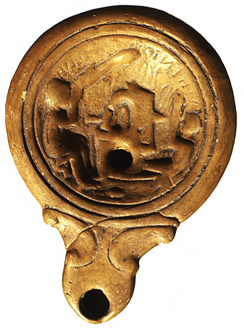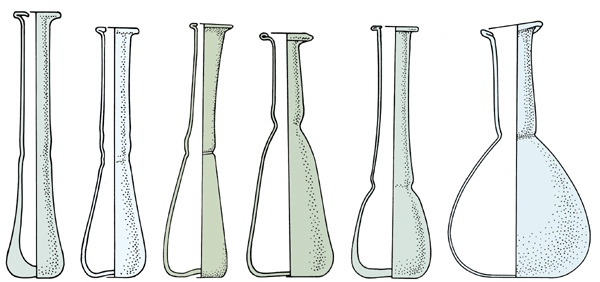The Early History of Unguentaria

Early Roman glassblowing depicted on a pottery lamp from Split, in Dalmatia
Early 1st century A.D.
Like so many ancient peoples, the Romans believed in an Afterlife that would be an idealized form of their worldly experience. So it was an obligation of the family of each dead Roman to provide furnishings for the grave, according to their means. Those furnishings always included a lot of domestic items—plates of food, flasks of wine, and so on—but it also was a tradition to include offerings of perfume.
So the arrival of glass in the Roman world had a profound social impact. The wealthy used to bury their dead with such offerings in bottles made of silver or alabaster; poorer folk now could mimic such items in either pottery or glass. Few free-blown glass bottles (unguentaria) for perfumes and other cosmetic preparations were as elegant or colorful as some might have wished, but they were something that everyone could afford. Unguentaria were one of the immediate successes of the newly emerging industry.
Asymmetry in the shape of many small unguentaria indicates how they were produced in short order, the bulb of the body beginning to droop down just as the neck was being sheared from the blowpipe. The repetitive rhythm of blow-and-shear must have made this work remarkably monotonous. Such rapidity of production was key, however, to why the Roman glassworking industry now embraced free-blowing as its core technology.
As the range and quality of free-blown products increased, the demise of glass-casting was swift: its only significant use beyond the mid 1st century A.D. was in production of fine, colorless tablewares. Within the space of just the four decades that enfolded the reign of Augustus (27 B.C.-A.D. 14), glassworking had undergone what can only be described as an industrial revolution. A couple of decades more and glass all but replaced pottery for all the bottles and jugs used in the storage and/or preparation of scented oils and lotions.

Various popular forms of unguentaria of the 1st century A.D.
